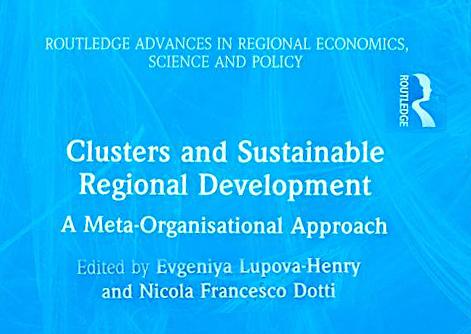Héloïse Berkowitz & Martine Gadille, chercheures en sciences de gestion au CNRS et rattachées au LEST, et Sanne Bor (Université LUT, Finlande) contribuent à l'ouvrage Clusters and Sustainable Regional Development. A Meta-Organisational Approach, sous la direction de Evgeniya Lupova-Henry & Nicola Francesco Dotti et édité par Routledge (Taylor & Francis Group).
Le livre s'appuie sur la perspective méta-organisationnelle des études de clusters, en opposition aux approches traditionnelles. Ce texte introduit un nouvel ensemble d'idées et de questions à l'intersection de la géographie économique, des études régionales et des clusters, de l'organisation et de la gestion, de la recherche sur les politiques et la gouvernance.
L'ouvrage sera disponible à partir de décembre 2022 et le sommaire est disponible sur le site de l'éditeur.
Auteur
Édition Taylor & Francis Group
Héloïse Berkowitz, Sanne Bor. Meta-organization as partial organization: An integrated framework of organizationality and decisionality (Chapitre 2). Clusters and Sustainable Regional Development. A Meta-Organisational Approach (à paraître 07/12/2022).
Abstract
Meta-organizations often lack the monitoring and sanctioning power associated with the organization of individuals, and thus they can be considered to be partially organized. Little research investigates the extent to which meta-organizations, in general, and clusters in particular, are organized. The current meta-organization literature thus perpetuates an implicit assumption that all meta-organizations are equally incomplete. We challenge this assumption and theorize variations in meta-organizations' organizational structures. To do so, we transpose the partial organization concept and specify at the meta-organization level: 1) degrees of structural organizationality, as measured by the selective combination of membership, hierarchy, rules, monitoring, and sanctioning, and 2) degrees of what we call decisionality, that is, the extent to which each organizational component is itself the object of decisions. By combining structural organizationality and decisionality, we identify four main meta-organizing dynamic profiles: thin partial meta-organization, thin meta-organizing, thick partial metaorganizing, and thick meta organizing. We contribute to current efforts to advance metaorganization theory and provide an analytical tool to investigate this phenomenon while providing a better understanding of clusters as social actors.
Keywords
Meta-organization, partial organization, oragnizationality, decisionality.
L'ouvrage sur le site de l'éditeur et le chapitre disponible en libre accès sur HAL.
- Chapitre d'ouvrage
Héloïse Berkowitz, Sanne Bor. Meta-organization as partial organization: An integrated framework of organizationality and decisionality. Clusters and Sustainable Regional Development. A Meta-Organisational Approach, 2022
7 décembre 2022 - [hal-03717158]
Auteur
Édition Taylor & Francis Group
Héloïse Berkowitz, Martine Gadille. Meta-organizing Clusters as Agents of Transformative Change through 'Responsible Actorhood (chapitre 4). Clusters and Sustainable Regional Development A Meta-Organisational Approach (à paraître 7 décembre 2022).
Abstract
How to organize clusters as local agents of transformative change, i.e. players that actively contribute to systemic sustainability transitions anchored in territories? We take a meta-organizational approach to the design of clusters for sustainability. We argue that achieving meta-organizational 'responsible actorhood' is a crucial condition for clusters to act as local agents of transformative change. Responsible actorhood allows to address the issues of lack of answerability, path dependency towards growth and labor resistance. Responsible actorhood involves 1) developing mechanisms to ensure 'metaorganizational accountability', 2) nurturing 'transformative mediated reflexivity' about technological ruptures and ecological performance in a public-centric approach and 3) enabling 'negotiated professional restructuring' to establish new knowledge processes at work. We contribute to the literature on clusters and STI policy, and to the metaorganization literature. Our work also has policy and practical implications for the design and steering of eco-industrial clusters.
keywords
Meta-organization, sustainable innovation, actorhood, accountability, reflexivity, professionality, eco-industrial clusters.
L'ouvrage sur le site de l'éditeur et le chapitre disponible en libre accès sur HAL.
- Chapitre d'ouvrage
Héloïse Berkowitz, Martine Gadille. Meta-organizing Clusters as Agents of Transformative Change through 'Responsible Actorhood. Clusters and Sustainable Regional Development A Meta-Organisational Approach, 2022
7 décembre 2022 - [hal-03721053]
